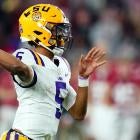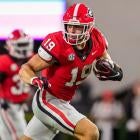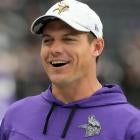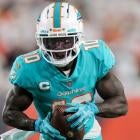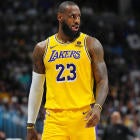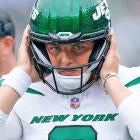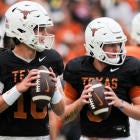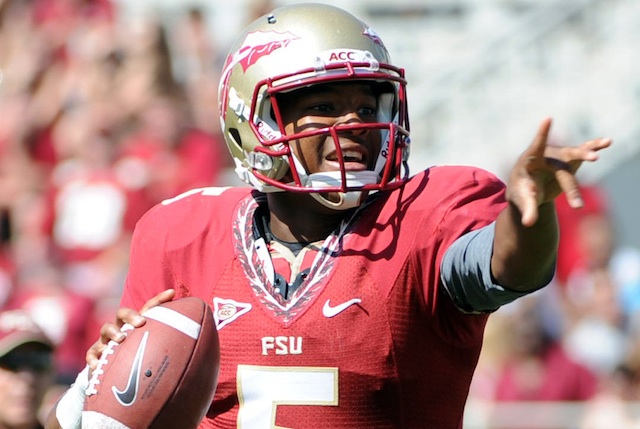
Until now, Auburn coach Gus Malzahn had never enjoyed the luxury having a starting quarterback return to college. He will learn the benefits in 2014 with Nick Marshall, who helped the Tigers come within 13 seconds of winning last year’s national title as a first-year starter.
“I think it means a lot,” Malzahn said of finally calling plays with a second-year starter.
Experienced quarterbacks typically can only help. Preseason top-10 teams Alabama, South Carolina and Ohio State (thanks to Braxton Miller’s season-ending injury) enter the season with new starting quarterbacks.
But the truth is, first-year starting quarterbacks have never been more successful than they are today. As the game evolves with more specialized teaching and conditioning at young ages and spread offenses that simplify decisions, the notion that you can’t win big with a new quarterback is gone.
New starting quarterbacks aren’t just winning accolades. They’re winning national championships at a nearly unprecedented rate.
| BCS Title Game Quarterbacks | ||
| Season | Quarterbacks | Career Starts Before Season |
| 2013 | Jameis Winston, FSU Nick Marshall, Auburn |
0 0 |
| 2012 | AJ McCarron, Alabama Everett Golson, Notre Dame |
13 0 |
| 2011 | AJ McCarron, Alabama Jordan Jefferson, LSU |
0 27 |
| 2010 | Cam Newton, Auburn Darron Thomas, Oregon |
0 0 |
| 2009 | Greg McElroy, Alabama Colt McCoy, Texas |
0 37 |
| 2008 | Tim Tebow, Florida Sam Bradford, Oklahoma |
13 14 |
| 2007 | Matt Flynn, LSU Todd Boeckman, Ohio State |
1 0 |
| 2006 | Chris Leak, Florida Troy Smith, Ohio State |
33 15 |
| 2005 | Vince Young, Texas Matt Leinart, USC |
19 26 |
| 2004 | Matt Leinart, USC Jason White, Oklahoma |
13 19 |
| 2003 | Matt Mauck, LSU Jason White, Oklahoma |
6 5 |
| 2002 | Craig Krenzel, Ohio State Ken Dorsey, Miami |
3 25 |
| 2001 | Ken Dorsey, Miami Eric Crouch, Nebraska |
14 29 |
| 2000 | Josh Heupel, Oklahoma Chris Weinke, FSU |
11 22 |
| 1999 | Chris Weinke, FSU Michael Vick, Virginia Tech |
10 0 |
| 1998 | Tee Martin, Tennessee Marcus Outzen, FSU |
0 0 |
| Note: Outzen replaced an injured Chris Weinke for the Fiesta Bowl after Weinke started most of the season. | ||
Five of the final seven BCS championships were won by first-year starters: Florida State’s Jameis Winston, Alabama’s AJ McCarron, Auburn’s Cam Newton, Alabama’s Greg McElroy and LSU’s Matt Flynn. First-year starters won just two of the first nine BCS titles (Ohio State’s Craig Krenzel and Tennessee’s Tee Martin).
Add in Notre Dame’s Everett Golson, Oregon’s Darron Thomas, Ohio State’s Todd Boeckman and Auburn’s Marshall, and nine of the past 14 quarterbacks to play for the national title were first-year starters. By comparison, only five of the 18 quarterbacks who played for a national championship from 1998 to 2006 were in their first year as a starter.
Another way to think of it: Over the past 50 years, 60 percent of the Associated Press champions were led by a returning quarterback, yet 71 percent of the champions since 2007 have had a first-year starter under center.
In the past 50 years, the only other similar stretch came when five first-year starters won AP national titles during a seven-year period from 1983 to ’89, according to a CBSSports.com analysis of past national champions. Those titles were won by Miami’s Bernie Kosar, Steve Walsh and Craig Erickson, Oklahoma’s Jamelle Holieway, and BYU’s Robbie Bosco.
“I think today’s game is a little more user-friendly to have dual-threat quarterbacks to have the offenses that we’re running,” said Duke coach David Cutcliffe, who once tutored Peyton and Eli Manning. “You’ve got great reads and play-actions, things that are a little simpler than (in the old system of) handing it off, play action, and you get to third down and you’ve got to succeed in a third-down pocket. I think younger quarterbacks can play more effectively because of that.”
Not long ago, the prevailing opinion in college football was that success wasn’t attainable without a veteran quarterback. (This notion was also true in the NFL, which saw Russell Wilson win the Super Bowl in his second year.) Experienced college quarterbacks such as Chris Leak, Vince Young, Matt Leinart, Ken Dorsey, Josh Heupel, Jason White, Eric Crouch and Chris Weinke used to be the top signal-callers. Last year, four of the AP's final top 10 teams won with a first-year starting quarterback (five if you count Missouri's Maty Mauk as a midseason starter in relief).
Three of the past four Heisman Trophy winners were first-year starting quarterbacks: Winston, Johnny Manziel and Newton. Tim Tebow started the trend by winning the Heisman as a sophomore in 2007 as a new starter after he was used in a limited package the year before.
“I think those are just exceptional players,” Ohio State coach Urban Meyer said before knowing he will need to rely on a new starter, J.T. Barrett, due to Miller injuring his shoulder again. “That’s surprising to see that, in my mind.”
McElroy, who won the 2009 national title for Alabama largely as a caretaker, believes teams no longer need experienced quarterbacks to win.
“Teams are really taking the ball out of the quarterback’s hands in some situations,” McElroy said. “When you look at what Jameis Winston and Nick Marshall did last year as such integral pieces of their offenses, and then you look at what AJ McCarron previously did, they’re really relying on getting the ball in their playmakers’ hands as opposed to trying to make plays himself. That’s not a negative. That’s a compliment. It allows the coaches to really coach without all of the improvisational skills that some of the experienced quarterbacks have.”
QBs learn at younger ages
When Ken Mastrole in 1996 became Maryland’s first redshirt freshman to ever start at quarterback, he admittedly was unprepared mentally to play in the Terrapins’ run-and-shoot offense. Today, he regularly talks with seventh-graders about coverages and reads and is part of the trend that helps accelerate the learning curve for quarterbacks.
Private quarterback coaches such as Mastrole are sprouting throughout the country, working with some players from middle school all the way into the NFL. Mastrole estimates that 70 percent of college quarterbacks today have a personal coach. Some college coaches, such as Malzahn and Florida State’s Jimbo Fisher, don’t allow their players to work with a personal quarterback coach due to fear of competing -- and sometimes wrong -- instructions.
“A lot of (private instructors) are teaching things that mechanically are not right so I can understand why coaches can be fearful,” Mastrole said. “You’re kind of like a big brother, not trying to overstep your boundaries. Sometimes a quarterback needs somebody who you can talk to on the side.”
Winston’s first serious training at quarterback began in the fifth grade with two-and-a-half-hour sessions several days a week while trained by a high school football coach in the Birmingham area. He regularly attended football camps at Hoover High School, a nationally-known program that helped create the 7-on-7 summer passing competitions. Winston's coaches marveled that he knew football as a seventh-grader in ways most high schoolers didn't know.
As Winston got older, his high school coach, Matt Scott, exposed him to elite camps that are now common for today’s quarterbacks.
“Things are getting exposed to quarterbacks -- the camps they’re being able to go to, the 7-on-7s in which they’re throwing year round, developing their game, their knowledge of the game,” Fisher said. “I think kids are developing themselves physically better. I think we’re lifting more, eating more, we’re doing all those things to enhance. Kids aren’t kids. They’re becoming young men much quicker.”
More high school coaches are teaching offenses that get used in college. Versions of the spread and no-huddle offenses filtered up first from high school. For instance, Washington State freshman quarterback Peyton Bender ran Mike Leach’s “Air Raid” offense “down to an exact T in high school,” Mastrole said. “There are a lot of very good offensive coordinators at the high school level.”
When Mastrole talks to college coaches now, they often ask him whether a prospect can start in a year or two. They also discuss X’s and O’s with high school players in a way Mastrole never did while being recruited in the 1990s.
“Coaches are doing a better job of their homework before a kid signs,” Mastrole said.
Private QB coaches watch Alabama competition
All of this has created a cottage industry for people such as Mastrole and David Morris, who was once Eli Manning’s backup at Ole Miss. Private quarterback coaches used to largely be on the West Coast, but they're becoming prevalent in the Southeast.
Morris was working in real estate in Mobile, Ala., and occasionally trained quarterbacks if a dad called looking for help with his son. Today, he is in his fourth year running QB Country as a full-time job, charging up to $175 per hour of individual work. QB Country has offices in Mobile, Birmingham, Nashville and Jackson, Miss., soon will branch out to Dallas and Orlando, and may open in Atlanta and Charlotte by January.
“There’s a common denominator of quarterbacks who did well early,” Morris said. “They’re very talented, they’re super competitive, and they’ve got a ton of poise. Then it takes some courage for a coach to let a young guy take over.”
Mastrole and Morris are interested observers of the most fascinating first-year quarterback battle this summer: Which veteran takes over Alabama’s high-powered offense with McCarron gone? Mastrole worked for three weeks with Blake Sims, a fifth-senior fighting for the Alabama job, and stays in touch with him. Morris has worked for six years with Jacob Coker, the Florida State transfer who is competing with Sims.
“If you want to look at the prototypical passer, you see a Jacob Coker and say, wow, that's very impressive,” Mastrole said. “Blake does some things that are maybe a little unorthodox. He might not be a perfect pro-style quarterback. But I think the guy is an exceptional leader. I think Blake has worked himself into the position that if he stays within the system, he can shock a lot of people, although not me.”
Morris, who worked with McCarron in high school, said Coker will have to win a tight competition with Sims but has the physical tools and intangibles needed. Coker is coming off a knee injury and must adjust to a new offense, teammates and the public perception that he's the heir apparent, even though no starter has been named yet.
“Coming in and learning a new offense, winning over new teammates and new coaches, and then having all the pressure on top of everything else, it’s a hard situation,” Morris said. “I know it’s a lot on him, but he can handle it. I think he’s trying to learn as fast as he can and become a consistent quarterback. He’s not a guy who thinks he has it figured out.”
Naturally, the trend of first-year success doesn’t translate to every new starter. Even those who succeed in Year 1 sometimes need a little time.
“With Cam (Newton), it really took me a good four games where I really knew fully what his strengths where -- which he had a lot of them -- to try to build around those,” Malzahn said.
But at this rate, it’s foolish to be surprised anymore when a new quarterback has immediate success.
“How many seasons start out where you just don’t know what a guy’s going to do?” Georgia coach Mark Richt said. “Even Jameis Winston, Johnny Football, their first year of starting, all of a sudden they win the Heisman. So anything can happen with a guy who gets his opportunity.”












